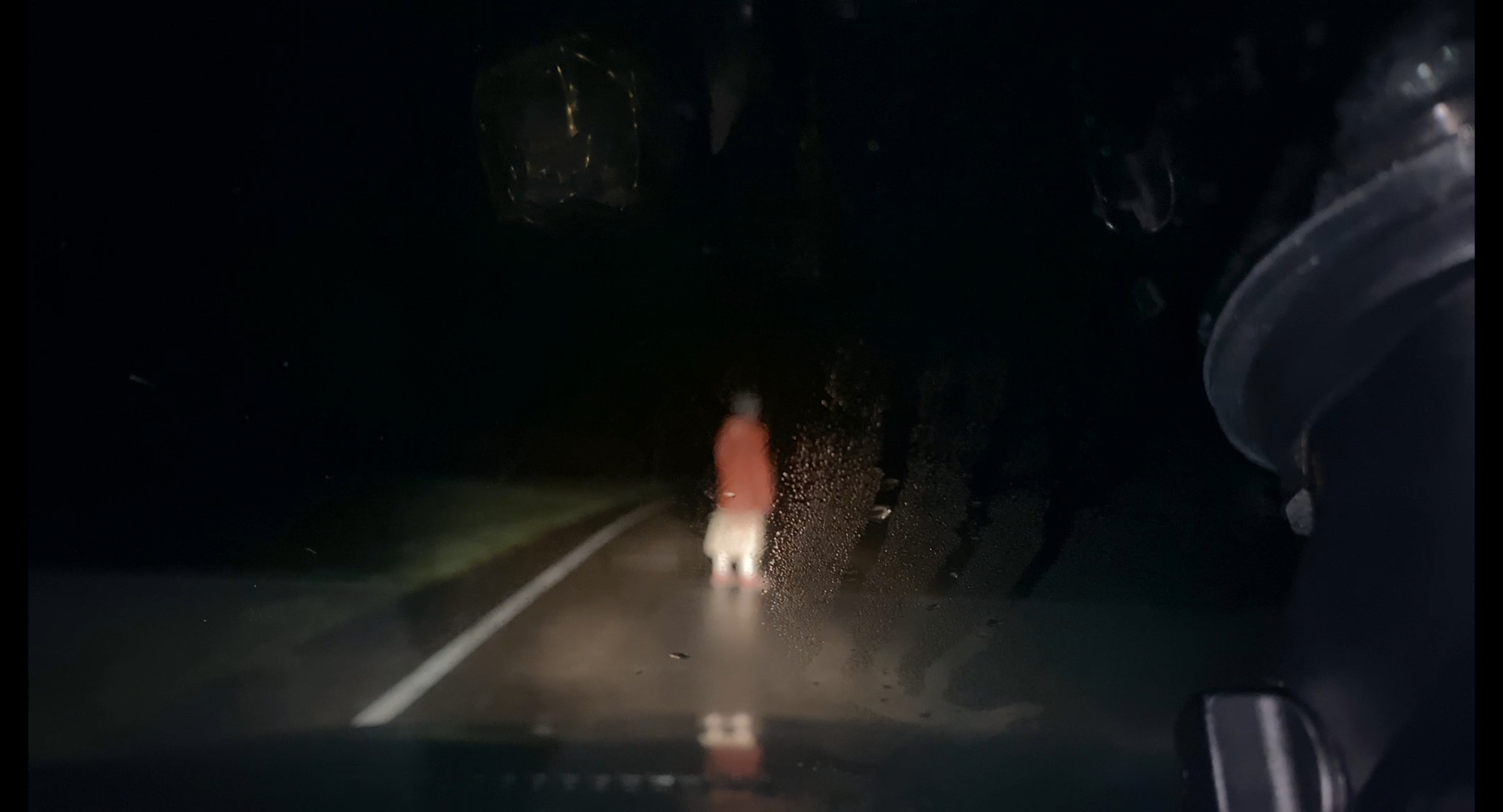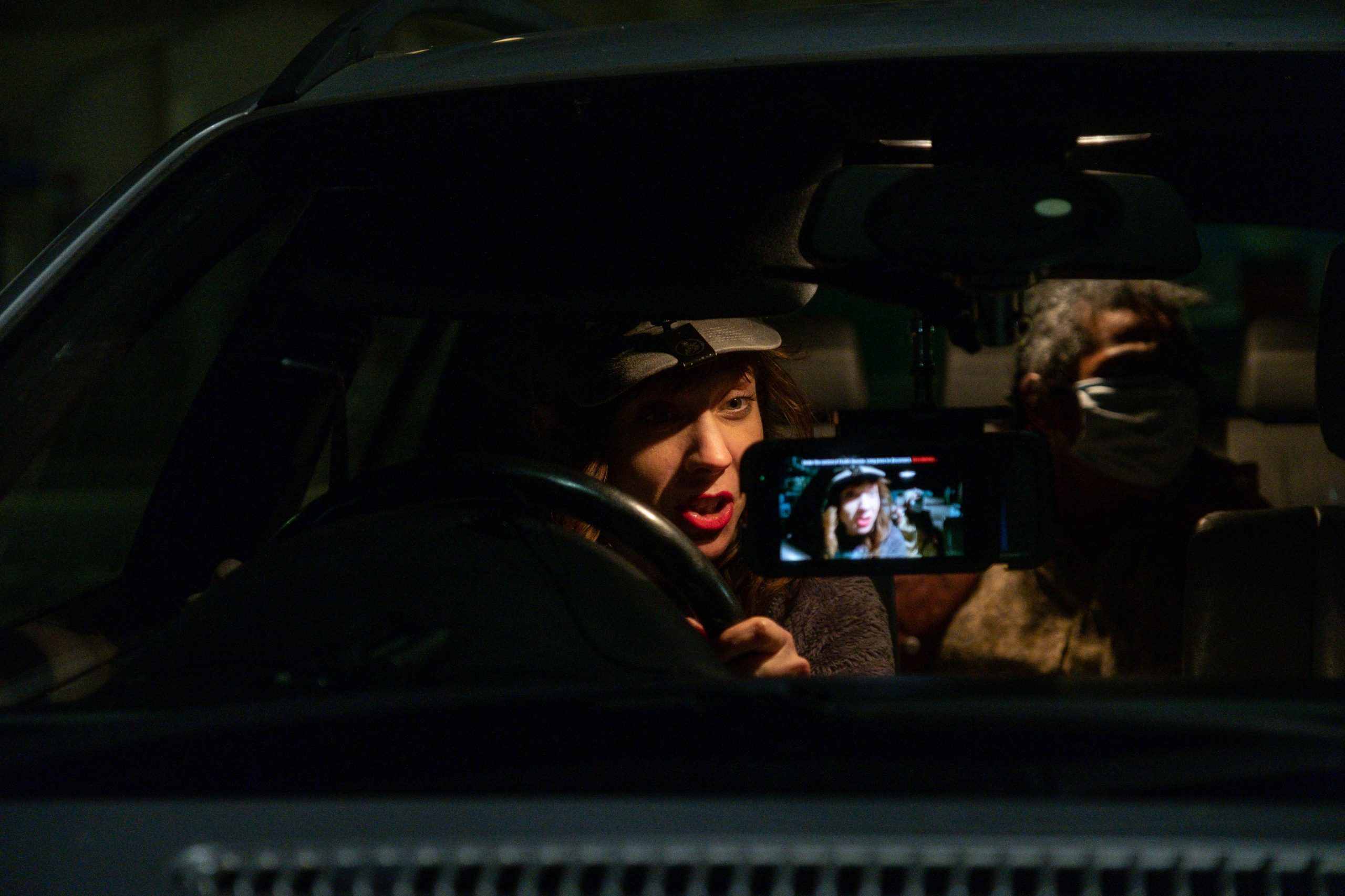
Rob Savage’s new feature film, Dashcam, is released in UK cinemas on Friday June 3. But Vue, one of the biggest cinema chains, seems to have pulled it completely.
UPDATE: Vue has responded to a query by Film Stories about Dashcam’s removal for the programme with the following statement:
“Our decision not to screen DASHCAM was informed purely by the commercial conditions not being viable. We are currently investigating the cause of the incorrect information about our rationale for not screening this film, and we are sorry for any confusion that this has caused.”
While Vue hasn’t officially commented on this, director Rob Savage shared a screenshot from a chat with a customer service agent who states that the chain has pulled all screenings of Dashcam because it might be offensive to viewers.
Sure, Dashcam is provocative, by design. It follows a right-wing live streamer on a batshit crazy car journey as she is faced with demons and monsters, the stuff of nightmares. Annie Hardy plays an exaggerated, very extreme version of herself, MAGA-hat and all. Annie is by no means a pleasant protagonist – in fact, she might be one of the least pleasant ones we’ve seen in a while – but Savage never condones her words or her actions within his film.
Apparently @vuecinemas have canceled our screenings of DASHCAM because the movie is too offensive!
If that doesn’t make you want to watch this film, what will? pic.twitter.com/FfOOgvumlC
— Rob Savage (@DirRobSavage) June 1, 2022
Horror films have always been subject to censorship. Whether it’s the video nasties of the 80s or the more recent A Serbian Film, horror has always proved to be too much. But one might argue that’s the whole point of horror and Dashcam writer Jed Shepherd definitely agrees.
“We need things that challenge us. And that’s the beauty of horror, you can do that in this particular genre. If a horror film is comfortable, you’re not doing horror right. You need to be horrified at what you see, because it needs to make you question yourself as well. And I think that’s what Annie does in Dashcam,” Shepherd told us in a recent interview.
Co-writer Gemma Hurley agrees.
“I think everyone goes into seeing a film about someone like Annie with their own judgments and it’s forcing you to look at yourself and question those ideas.”
This isn’t the first time Vue has taken a harsh stand on things. In 2019, Vue banned Blue Story in its cinemas after a brawl at one of the screenings in Birmingham. The chain eventually brought the film back, with added security measures, but Dashcam hasn’t even had the chance to be shown to audiences yet.

If Vue has indeed banned dashcam altogether, it sets a dangerous precedent in the industry. If dashcam is considered offensive, what else is offensive? What people are offended by is subjective and individual so technically, almost anything could potentially be offensive to someone. So, where do we draw the line?
Sure, we shouldn’t condone films with actual violence against anyone, or any animal cruelty. We shouldn’t stand for hate speech or inciting violence. But showcasing something in one’s film doesn’t necessarily mean the filmmaker approves of it and as stated before, Savage never condones Annie’s actions. In fact, Annie is punished, continuously and viciously, for her trespassings.
The BBFC has rated Dashcam 18 and the site details exactly why. The information about Dashcam’s offensiveness is publicly available and let’s be honest, Dashcam is the kind of film you only go to see if you know exactly what it is. Rarely do people find themselves at a cinema and only there decide what to watch, blindly choosing an 18-rated horror film and then being surprised when said film is gross and provocative.
Besides, as Savage notes in his tweet, surely this just makes Dashcam so much more notorious and desirable for horror fans? Horror rides on that aura of notoriety and Dashcam has it in buckets.
The team behind Dashcam always knew it would be controversial. Shepherd noted “This is a film, this is not real” during our interview, insisting that the Annie we see on screen is not how the real Hardy would behave.
At worst, Vue’s decision to pull Dashcam might be a sign that we are entering a new era of censorship. Disney+ attached warnings to some of the older films, warning people that these films include outdated depictions. So why not simply attach a warning to Dashcam? Even that seems like a dodgy move, but surely it would be better than pulling a film altogether before people have had a chance to see it and make their own minds about it?
I’m a good sport about bad reviews. Come on, I made 11-11-11. But @nypost I know a few horror fans that would disagree with these ridiculous statements about “these types” of movies. pic.twitter.com/VfhURP8r8w
— Darren_Bousman (@darren_bousman) May 15, 2021
Horror has also always drawn criticism, as well as its fanbase. In their review of Saw-sequel Spiral, New York Post branded all horror fans as “depraved lunatics” and horror films as “completely and utterly worthless.” These are cruel words and it’s hard not to imagine if Dashcam existed outside the genre of horror, things would be different. If we removed the monsters and the gore, and made this about a right-wing woman on a road trip with an elderly lady, would it still be shown at Vue?
Pulling Dashcam is a troubling decision on Vue’s part and censorship is a slippery slope. Who gets to decide what is shown and what isn’t? How is screening American Sniper, a film about NAVY Seal Chris Kyle who was reportedly the most lethal sniper in US military history any better than screening Dashcam?
There aren’t any obvious or clear answers to a lot of questions about film censorship. We do know that horror films are meant to challenge you and are often morally ambiguous, prompting us to re-evaluate our own sense of ethics. To effectively censor a film that hasn’t been released yet seems harsh and cruel and potentially sets us on a very dangerous path.



